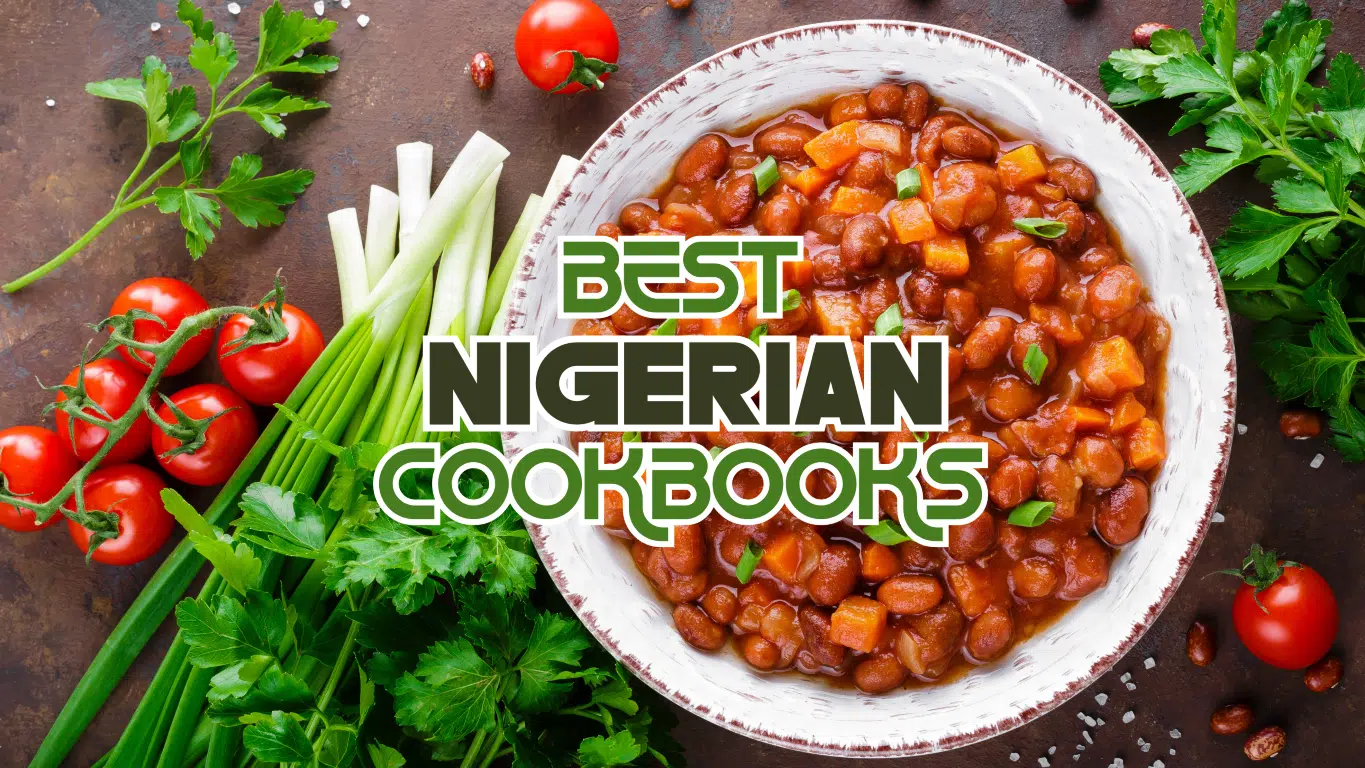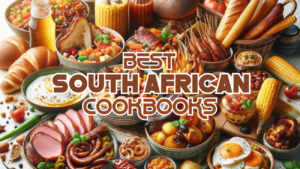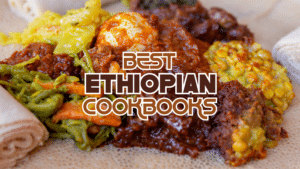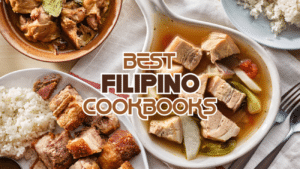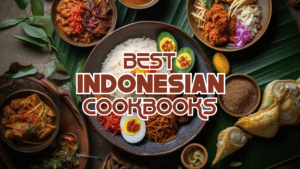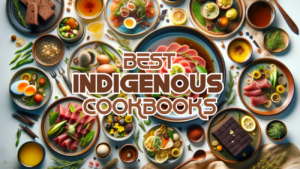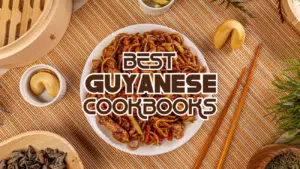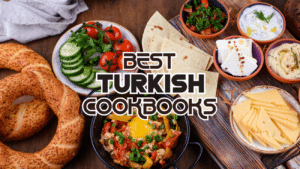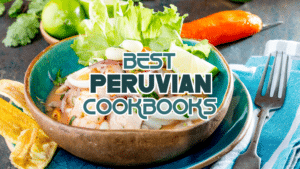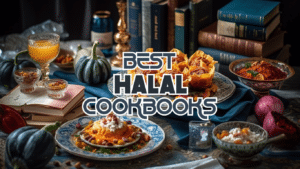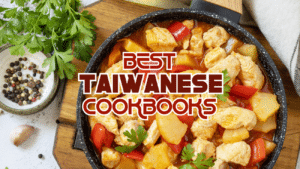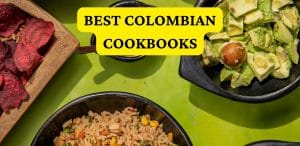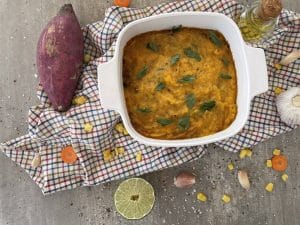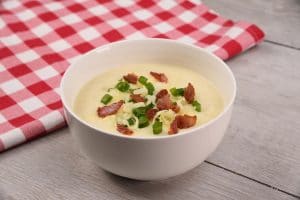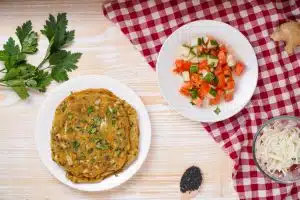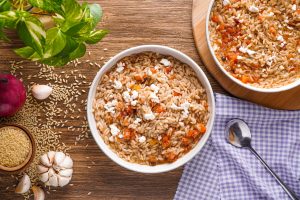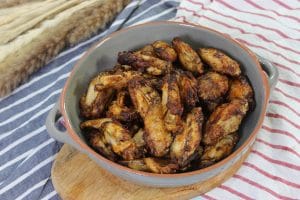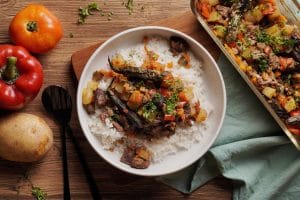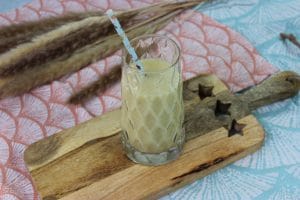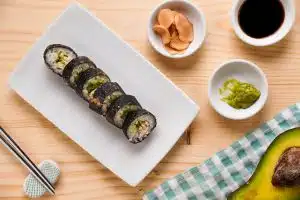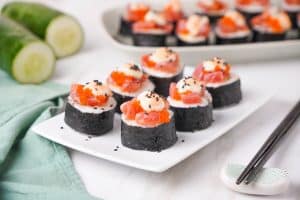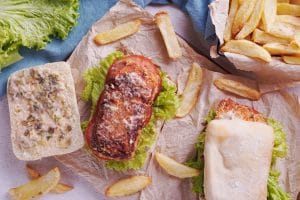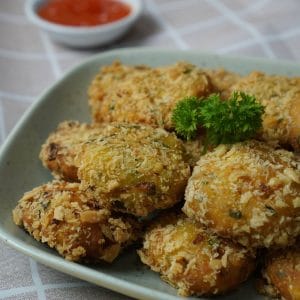Best Nigerian Cookbooks
Important Note: When you buy through our links, we may earn a commission. As an Amazon Associate we earn from qualifying purchases. Content, pricing, offers and availability are subject to change at any time - more info.
Nigeria, a country known for its rich cultural diversity and mouthwatering food, offers an array of dishes that are as vibrant as its people. With a wealth of ingredients and cooking methods unique to various regions, Nigerian cookbooks provide an indispensable guide to mastering the flavors and techniques that define the nation’s diverse gastronomic landscape. From iconic jollof rice to comforting bowls of pepper soup, hearty pounded yam served with egusi, or the ever-popular street food favorite suya, these cookbooks deliver all the secrets of treasured Naija cuisine. We have all the best Nigerian cookbooks in circulation reviewed, with each sharing iconic meals, lesser-known recipes, and elevated time-honored techniques.
Key Takeaways
- Complete beginners and those totally unfamiliar with Nigerian cuisine will find everything they need to know to learn, master, and love Naija food in Flo Madubike’s All Nigerian Recipes, 70 NIGERIAN RECIPES YOU NEED TO TRY from Mr. Dayo Bukunmi Fadare and Mrs. Ruth Fadare, and the print-only masterpiece, Chy Anegbu’s Nigerian Cookbook for Beginners.
- For elevated Naija cuisine, readers can’t go wrong with either Nigerian Soups, Stews & Sauces: A Sisi Yemmie Cookbook by Yemisi S. Odusanya or The Ultimate Nigerian Cookbook from the Anegbu brothers, which has no digital release available.
- Vegans have several Nigerian plant-based cookbooks at their disposal, but the majority are only available in print. Vegan Nigerian Kitchen and Afro Vegan are excellent, but if you’re looking for a digital edition, Abby Ayoola’s Africanizing Vegan Food Revised is the cookbook for you.
- Key Takeaways
- All Nigerian Recipes Cookbook by Flo Madubike
- 70 NIGERIAN RECIPES YOU NEED TO TRY: Ultimate Nigerian Step By Step Cookery Book by Mr. Dayo Bukunmi Fadare and Mrs. Ruth Fadare
- Nigerian Soups, Stews & Sauces: A Sisi Yemmie Cookbook by Yemisi S. Odusanya
- Nigerian Cookbook: Traditional Nigerian Recipes Made Easy by Grizzly Publishing
- 100+ Low Carb and Keto Recipes with Nigerian Vibes by Ada Powers
- Nigerian Cuisines: A Historical Compilation of Mouthwatering Traditional Delicacies from Hausa, Yoruba, and Igbo Ethnicities by Joseph Ifechukwude Chiadika
- Best Vegan Nigerian Cookbooks
- Best Print-Only Nigerian Cookbooks
- The Ultimate Nigerian Cookbook (7th Edition): Easy Recipes for 92 Traditional Foods from Nigeria by Chy Anegbu and David Anegbu
- Nigerian Cookbook for Beginners: Step-by-Step Recipes for Most Popular Nigerian Foods by Chy Anegbu
- Longthroat Memoirs: Soups, Sex and Nigerian Taste Buds by Yemisi Aribisala
- Frequently Asked Questions – Best Nigerian Cookbooks
Each of the upcoming top six best Nigerian cookbooks is available in both digital and print formats. With all the insight both beginners and seasoned cooks could ever hope for, there are no better recipe collections or guidebooks to help the reader explore the culinary art of Nigeria’s famous food.
All Nigerian Recipes Cookbook by Flo Madubike
Out of all of the fine options reviewed, All Nigerian Recipes Cookbook is easily one of the most substantial in print. Just about every classic Nigerian dish is covered with tons of indispensable tips scattered throughout. The recipes are classified into kids’ meals, rice recipes, spaghetti & noodles, chicken recipes, soup, snacks, stews & sauces, restaurant specials, beans, plantain recipes, yam & cocoyam recipes, salads, Nigerian drinks, fufu (pounded yam dishes), finger foods, and breakfasts. After the abundance of recipes, common cooking tasks are explained.
This includes extracting coconut milk, removing the bitterness from bitter leaves, freshening up dry bitter leaves, processing akamu, ogi, or pap from corn (essentially fermenting cereal from grains), making stock cubes, removing the outer skin from beans, extracting palm fruit concentrate, and how to parboil rice the Nigerian way. Readers are taught how to make everything from scratch in the traditional Naija manner. Even though all the authenticity one could hope for is there, crystal clear instructions guarantee that every superb dish is easy to accomplish by all cooks, novices included.
About The Author: Currently residing in Germany, Flo Madubike is a renowned Nigerian food expert and the mastermind behind the popular All Nigerian Recipes brand. Madubike has dedicated herself to sharing her passion for Nigerian cuisine through her YouTube channel, website, and cookbooks, becoming a significant influence in the global culinary scene.
70 NIGERIAN RECIPES YOU NEED TO TRY: Ultimate Nigerian Step By Step Cookery Book by Mr. Dayo Bukunmi Fadare and Mrs. Ruth Fadare
70 Nigerian Recipes You Need To Try is a wonderfully authentic cookbook featuring all of Nigeria’s favorite foods. Each recipe delivers straightforward instructions that detail the techniques behind preparation and cooking exactly. There’s no advanced culinary discourses delving into the intricacies of Nigerian cooking, but neither are there any steps lacking. It’s instructions that you can’t go wrong with, but some of the ingredients may be obscure to those new to cuisine from the Giant of Africa. Unfortunately, the only drawback to this otherwise excellent book is its total lack of pictures.
As a cookbook filled with traditional fare, certain ingredients will be hard to source, but the majority are accessible. Readers should be warned that the author refers to many recipe components by their localized brand names, so if anything is unfamiliar (such as ‘Maggi cubes,’ which are nothing but a local brand of stock cubes), be sure to give it a search online. You’ll soon see that alternatives are within easy reach and are, in most cases and pantries, on hand.
About The Author: Dayo Bukunmi Fadare and Ruth Fadare are a dynamic Nigerian culinary duo committed to sharing the rich flavors of their country’s cuisine with the world.
Nigerian Soups, Stews & Sauces: A Sisi Yemmie Cookbook by Yemisi S. Odusanya
Nigerian Soups, Stews & Sauces: A Sisi Yemmie Cookbook is a showcase of Nigeria’s finest and most favored dishes. West African cuisine, especially that of Nigeria, is renowned for its hearty, thick stocks and single-pot meals oozing with flavor. This beautifully crafted cookbook presents the reader with a devoted focus that’s much deserved. You’ll learn exactly how to extract the richness that Naija’s slow-cooked stews, soups, and sauces have become famous for. Not every single last classic Nigerian recipe is featured, but those present are without-a-doubt the nation’s most iconic meals.
Don’t let the seemingly short length of Nigerian Soups, Stews & Sauces: A Sisi Yemmie Cookbook deter you, for there are few other publications or even online recipe collections that can compare to the depth of flavor and inspired recipe construction featured. The overall quality is exemplary. Its instructions are near foolproof, with authenticity and time-honored traditional flavors and techniques shining clear along every step of the way. Full-color photographs show those unfamiliar with exactly what end results they’re aiming for.
About The Author: Yemisi S. Odusanya is a Nigerian-American author, food blogger, and recipe developer based in Atlanta, Georgia. As the creator of the popular food blog Sisi Yemmi, law-degree holder, and seasoned cook, Odusanya has established herself as a foremost authority on Nigerian food. She has collaborated with several brands, including but not limited to Knorr.
Nigerian Cookbook: Traditional Nigerian Recipes Made Easy by Grizzly Publishing
For simplistic instructions and simplified recipes suited to the modern kitchen, you can’t go wrong with the Nigerian Cookbook: Traditional Nigerian Recipes Made Easy. Prospective readers should note that this is a cookbook that omits elaborate narratives and anecdotes, instead serving up to-the-point recipes that cite nothing but their core instructions and a basic description of each. There are no photographs which means you’ll either need to be accustomed to Nigerian cuisine or resort to a quick Google.
With this being said, the selection of recipes offers something for everyone, touching on the full spectrum of what the most populous African nation has to offer. The author has included notes to accompany each creation that thoughtfully lists must-know tips and preparation advice in a refreshingly concise manner. Expect to find Nigerian breakfasts, appetizers, dinners, and desserts of the highest quality waiting.
About The Author: Michigan-based publishing house, Grizzly Publishing, holds a specialization in localized cookbooks covering various countries around the world. All international cuisine is authentically composed and wonderfully detailed in such a way that even beginners will thrive when following any of the company’s book’s guidance.
100+ Low Carb and Keto Recipes with Nigerian Vibes by Ada Powers
- Total Recipes: 100+
- Total Pages: 381
- Recipes Preview: Avocado Bacon And Eggs, Coconut Flour Bread, Keto Breakfast Bars
- The Best Recipe We Want To Try: Eggplant Pap (Aubergine Porridge)
- Affordability: Moderate
100+ Low Carb and Keto Recipes with Nigerian Vibes is a cookbook filled with healthy recreations of some of Nigeria’s favorite foods. Unlike many localized cookbooks that cover indigenous dishes only, readers can expect to find a good balance of global cuisine and go-to Naija favorites. Descriptions are brief, instructions concise, and there’s a small but legible image accompanying every meal. Basic nutritional information is supplied, and the step-by-step guidance couldn’t be simpler.
While not necessarily the most traditional Naija cookbook available, 100+ Low Carb and Keto Recipes with Nigerian Vibes does manage to deliver a range of tasty recipes that you can’t go wrong with. You’ll be happy to know that every recipe featured is approachable regardless of where in the world you may be based. Even though many of the flavors and meals featured are distinctly Naija-inspired, they’re free from exotic ingredients only found in the nation itself.
About The Author: Ada Powers is a Nigerian author and poet based in Mowe, Ogun. With a selection of books spanning inspirational works and food, Powers proudly showcases his heritage through each and every word shared.
Nigerian Cuisines: A Historical Compilation of Mouthwatering Traditional Delicacies from Hausa, Yoruba, and Igbo Ethnicities by Joseph Ifechukwude Chiadika
Before exploring what Nigerian Cuisines has to offer, potential buyers should be warned that this is a very short cookbook. Its digital edition is worthy of consideration, but most will be deterred from print copies due to the exorbitant cost. With this being said, those interested in classic Nigerian cuisine will be happy to know that recipes from Hausa, Yoruba, and Igbo ethnicities are all covered, thereby showcasing the whole country’s cookery. There may be but thirty dishes detailed, but every last one is easily among the best you’ll find anywhere.
Nigerian Cuisines reads like a collection of family recipes and notes from a loved one well-versed in Nigerian cooking. As a result, the author assumes a certain degree of familiarity in the kitchen. Many recipes resort to vague measurements, which isn’t necessarily a bad thing, as this also means that meals are extremely customizable. The traditional flavors and essential local recipe composition are there, but the cook will often have to decide how much of each ingredient to add for themselves. Nonetheless, each recipe comes out amazing, with quality so good that it’ll satisfy the most demanding locals and newcomers alike.
About The Author: Joseph Ifechukwude Chiadika is an acclaimed Nigerian author of Igbo ethnicity. The writer and research consultant may be fairly new to culinary publishing, but his work is a prime example of authentic Naija cuisine elevated to all-new heights.
Best Vegan Nigerian Cookbooks
Nigeria’s vibrant culinary scene offers a unique opportunity for those seeking to explore the world of vegan cuisine through the lens of West African flavors. Our selection of the best Vegan Nigerian Cookbooks presents a treasure trove of plant-based recipes, showcasing ingenious adaptations of quintessential Nigerian dishes that always stay true to their origins.
Africanizing Vegan Food Revised: All Your Favourite Nigerian Foods Veganized. by Abby Ayoola
Africanizing Vegan Food Revised is a cookbook that’s filled with amazing plant-based recreations of classic Naija cuisine. Nigeria’s most beloved soups, snacks, stews, mains, and fermented cassava meals called fufu are all featured. Unlike so many other regional cookbooks covering the country’s cuisine, this brilliant recipe book boasts full-color photographs accompanying each recipe. The ingredients are also all easy to source without any compromise on authentic flavor.
Every recipe in Africanizing Vegan Food Revised is sure to come out tasting and looking great, but the author omits explaining certain advanced aspects of many of the steps. The instructions are easy to follow, and the basic recipe composition straightforward, but other than quantities and timing guidelines for sauteing, simmering, and the like, there’s no exact advice stating what degree of cooking needs to be reached. For example, instead of specifying the precise texture required when cooking lentils, noodles, or other ingredients, the cook is left to decide for themselves. Nonetheless, with even just basic experience under your belt, there’s no going wrong. The flavors are out of this world.
About The Author: Acclaimed author and host of the ever-popular podcast, How To Survive Society and Birth in Power, Abby Ayoola-Williams, is quickly rising to become a global authority on healthy living. Affectionately known as the “Bronze Barbie,” Ayoola-Williams perfectly captures the essence of Nigerian cuisine through all her work.
Vegan Nigerian Kitchen: 100 Classic Recipes With A Plant-Based Twist By Tomi Makanjuola
Vegan Nigerian Kitchen: 100 classic recipes with a plant-based twist is one of the most inspiring Nigerian cookbooks around, but it’s only available in print. There’s no digital release. The reader is taken through traditional techniques and ingredients while being given in-depth context into Nigerian culture as well. With photographs that’ll make your mouth water and recipe instructions that no cook can go wrong with, this is one cookbook that’s sure to impress. The quality of each meal’s construction is so good that all plant-based eaters are sure to discover new favorites, regardless of whether or not they’re into Naija cuisine itself.
The book is chaptered into basic recipes, vegan “egg” dishes, porridges, rice dishes, swallows (fufu), soups and stews, savory snacks, light meals, and sides, sweet snacks and pastries, and drinks and cocktails. The level of detail in Vegan Nigerian Kitchen is exemplary, but as a book that stays true to traditions, many of the ingredients will be extremely hard to source outside of Nigeria. Don’t let this deter you, for the majority of recipes remain approachable without hunting exotic imports.
About The Author: Tomi Makanjuola is a London-based food blogger, cookbook author, and recipe developer. Her passion for food and cooking stems from her Nigerian roots and upbringing, as well as her travels around the world. The acclaimed influencer famous for The Vegan Nigerian blog has been featured by outlets like BBC Radio London, The Independent, and BuzzFeed, and she continues to grow her global audience.
Afro Vegan: Family Recipes From A British-Nigerian Kitchen By Zoe Alakija
Vegan Nigerian cuisine doesn’t get much more innovative or inspiring as the mouthwatering creations filling the pages of Afro Vegan: Family Recipes from a British-Nigerian Kitchen. Instead of classic Naija recipes that remain painstakingly true to exotic, local ingredients and methods, the author fuses contemporary British cookery with the rich flavors that have made Nigeria’s food treasured throughout the African continent. It’s a book that’s sure to broaden your horizons, regardless of how experienced you may or may not be with Hausa, Igbo, Yoruba, and Edo meals.
Complete beginners are capable of pulling off stunning dishes with a distinctive Nigerian flair thanks to the quality and clarity of the instructions, combined with captivating pictures that are sure to make you crave cooking each recipe. Readers can expect to find mainly savory meals with a decent selection of sweets, snacks, and drinks featured too. Every recipe is concisely but sincerely introduced through brief storytelling that’s sure to familiarize one with why and how ingredients and flavors are used. Afro Vegan is a book that’s a true gem to anyone following a plant-based diet, with results so good that even meat-eaters will be impressed.
About The Author: Zoe Alakija is a British-Nigerian chef, food writer, photographer, and founder of the pop-up Western African restaurant Zoe’s Ghana Kitchen. Zoe’s culinary expertise stems from her extensive travels across Africa and Europe, where she has spent time exploring local cuisines and gathering inspiration for her recipes. Her cooking style is a blend of contemporary and traditional, with a focus on using fresh, seasonal ingredients to create flavorful and nourishing dishes.
Best Print-Only Nigerian Cookbooks
Some of the very best Nigerian cookbooks ever written are only available as a physical copy, with no digital release offered. Here are the essential Naija recipe books every serious cook needs to consider.
The Ultimate Nigerian Cookbook (7th Edition): Easy Recipes for 92 Traditional Foods from Nigeria by Chy Anegbu and David Anegbu
The Ultimate Nigerian Cookbook, in its seventh edition, could very well be exactly as it defines itself – the most comprehensive Nigerian cookbook in circulation. Traditional Naija food has been elevated and adapted for the modern kitchen without losing touch with its authenticity whatsoever. No other Nigerian cookbook comes close to the level of detail showcased through the detailed copy and over 500 photographs depicting every advanced step involved. All recipes deliver crystal-clear guidance with countless tips scattered throughout.
Nigerian soups, rice dishes, pastries, recipes focused around small chops, drinks, yam-based food, breakfasts, lesser-known local delicacies, and Swallow (fufu) recipes are featured. After supplying the reader with a concise but detailed discourse on Nigerian ingredients, spices, and culinary traditions, the recipes follow, with additional information concerning traditional table & food decorations and menu planning following. With a perfect balance between simplistic meals and complex creations, The Ultimate Nigerian Cookbook is an indispensable reference that all cooks should consider.
About The Author: Chy Anegbu and David Anegbu are Nigerian-born authors and chefs with a passion for traditional Nigerian cuisine. Chy Anegbu is a certified chef and holds a degree in hospitality management, while David Anegbu is an entrepreneur with extensive experience in the food industry. Together, the Anegbu brothers have dedicated themselves to promoting Nigerian cuisine and sharing its rich flavors with the world.
Nigerian Cookbook for Beginners: Step-by-Step Recipes for Most Popular Nigerian Foods by Chy Anegbu
Nigerian Cookbook for Beginners: Step-by-Step Recipes for Most Popular Nigerian Foods by Chy Anegbu is an invaluable guide that takes a supremely practical approach to Naija cuisine. Nigeria’s most popular dishes are featured, listing accessible ingredients across the board. The step-by-step instructions couldn’t be easier to follow, making this a go-to cookbook for complete newcomers to both localized meals and cooking in general. Each recipe is accompanied by vivid descriptions of the ingredients, their cultural significance, and the techniques used in the preparation process.
Despite being geared towards novices, the Nigerian Cookbook for Beginners has tons of information and guidance sure to improve the know-how of even the most experienced chefs. By the time the reader has gone through this brilliantly insightful cookbook filled with 400 photographs, they’ll have mastered not only traditional core recipes but gained unforgettable, versatile wisdom concerning Nigerian ingredient combinations and flavors as well.
About The Author: From her homeland Nigeria, Chy Anegbu has steadily grown in global popularity through the release of approachable cookbooks and blogs celebrating Naija cuisine.
Longthroat Memoirs: Soups, Sex and Nigerian Taste Buds by Yemisi Aribisala
Longthroat Memoirs: Soups, Sex, and Nigerian Taste Buds is a captivating, genre-defying work that explores the vibrant world of Nigerian cuisine and culture. The author weaves together mouthwatering descriptions of traditional Nigerian dishes with compelling personal narratives and insightful reflections on Nigeria’s culinary landscape. With an unapologetically bold writing style, it’s a food memoir brimming with culture that compels you to read more.
Longthroat Memoirs goes beyond a mere collection of recipes and delves into the complex, intimate relationship between food and the Nigerian identity. It is the perfect book for anyone who wants to get a feel for life in Nigeria while at the same time assimilating context that grants a sincere appreciation for the country’s food and traditions. If you’re looking for recipes and techniques alone, this isn’t the book for you, but all those fascinated and/or fond of Nigeria and Naija cookery will be spellbound.
About The Author: Yemisi Aribisala is a Nigerian author, essayist, and food writer renowned for her literary style of writing and unique approach to storytelling through food. In addition to her writing, Aribisala is a passionate cook and has hosted pop-up restaurants and supper clubs in London. She has also presented cooking shows on Nigerian television and has been a judge on the popular Nigerian cooking competition show Knorr Taste Quest.
Frequently Asked Questions – Best Nigerian Cookbooks
If there is any aspect of Nigerian food that you’ve been left wondering about, we may have the answers you need waiting here. Those with a general fondness for African cuisine will find more inspiring creations from the continent in our wrap-up of the best Ethiopian cookbooks. Be sure to give it a look.
Jollof rice stands out as a popular and iconic dish that many Nigerians consider the number one food. This flavorful rice meal originating from the Wolof people of Senegal and Gambia is a staple at festive occasions, family gatherings, and restaurants throughout Nigeria. The dish typically consists of long-grain parboiled rice cooked in a rich tomato sauce, along with a medley of onions, bell peppers, and scallions. Seasonings like thyme, curry powder, and bay leaves add depth of flavor, while protein options like chicken, beef, or fish are the most commonly featured.
One dish that is widely consumed and enjoyed across Nigeria is “swallow” – a term that refers to various starchy staples typically served with soups or stews. Swallow is prepared in various forms, including but not limited to eba (garri), pounded yam, fufu, amala, and tuwo shinkafa. These staples are crafted from grains, tubers, or roots, such as cassava, yams, plantains, and rice. The raw ingredients are boiled until soft and then pounded into a smooth, dough-like consistency. Diners pinch off small pieces of swallow and normally roll it into a ball before dipping it into soups or stews. Swallow is never chewed but rather swallowed whole after dipping, hence the name.
Although specific regional dishes may differ, a standard Nigerian breakfast usually includes a carbohydrate base, protein, and some form of beverage. As the foundational carb around which the meal is built, Nigerians generally opt for starchy staples or grains. In the south, popular choices include akara (deep-fried bean cakes), moi moi (steamed bean pudding), or yam, which can be boiled, fried, or roasted. In the north, locals prefer dishes like masa (rice cakes) or tuwo masara (cornmeal porridge). Bread is also a popular choice, with a dense, chewy loaf called agege bread being a nationwide favorite. Accompanying these carb-heavy dishes is a protein source, such as fish, eggs, or meat. Suya (grilled meat skewers) is a leading option. Otherwise, the fermented cereal porridge called ogi is very often served in place of meat-based protein. When tea, coffee, or hot chocolate aren’t consumed to round off the meal, the cold drink zobo, made from hibiscus flowers or millet-based kunu, is most-often Nigeria’s top pick as a breakfast beverage.
